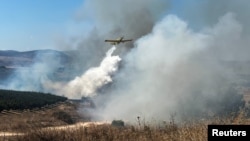In 2006, following intense fighting between Israel and Hezbollah, the UN Security Council adopted Resolution 1701. For the past 18 years, quiet had largely been maintained along the line dividing Lebanon from Israel and the Golan Heights.
“However, that stability was shattered on the morning of October 8th when Hezbollah initiated a barrage of rocket attacks on Israel, and armed terrorists subsequently infiltrated Israel from across the Blue Line in the aftermath of Hamas's brutal and unprecedented terrorist attack on Israel,” said U.S. Alternate Representative for Special Political Affairs in the United Nations.
“Hezbollah made the escalatory decision to bombard communities in northern Israel. And for the past 11 months it has done so on nearly a daily basis.”
“It is wrong that this council has yet to condemn Hezbollah for these repeated destabilizing actions,” declared Ambassador Wood.
“Hezbollah's violent attacks put Israeli and Lebanese civilians at risk. They jeopardize Lebanon's stability and sovereignty. Lebanon should not be a haven for terrorist organizations or a launchpad for attacks against Israel.”
“There is no dispute that Iran, in clear violation of the arms embargo in resolution 1701, provides Hezbollah with the majority of the rockets, missiles and drones that are fired at Israel,” noted Ambassador Wood.
“And let's be clear, Israel has a right to defend itself against Hezbollah's attacks. No member of this Council facing a brutal terrorist organization on its border, would tolerate daily attacks and displacement of tens of thousands of its own people. The United States supports Israel's right to defend itself, and we will keep working for regional stability.”
“We do not want to see conflicts intensify and spread,” stressed Ambassador Wood. Specifically, the United Nations Interim Force in Lebanon, or UNIFIL, helps promote stability along the border between Israel and Lebanon.
Going forward, said Ambassador Wood, this Council needs to push for resolution 1701’s full implementation, including by establishing an area south of the Litani River that is free of any armed personnel, assets or weapons other than those of the Lebanese government and UNIFIL. It is imperative UNIFIL be able to freely monitor and report any actions contrary to U.N. Security Council Resolution 1701.
The extension of the UNIFIL mandate ensures an important pillar of stability in Lebanon remains in place to help secure peace.














